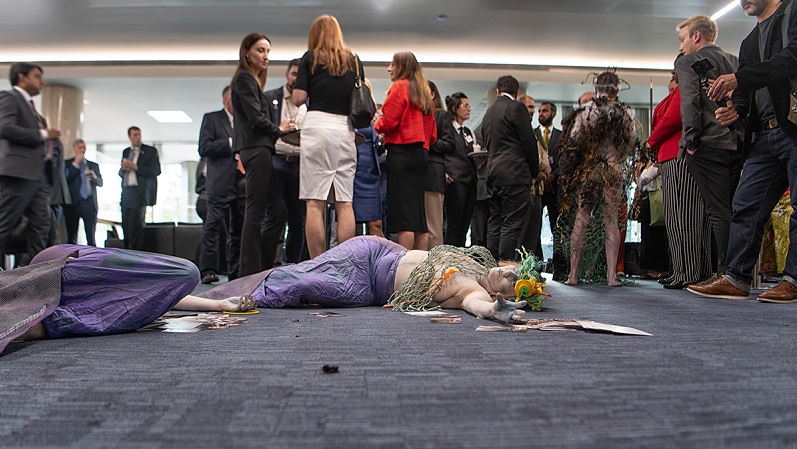Climate vulnerable Pacific islands struck a deal with emerging economies worried about the targets’ impact on economic development
Governments have agreed to an improved set of climate goals for the shipping sector after climate vulnerable Pacific nations and trade-reliant emerging economies struck a compromise at talks in London.
After two weeks of negotiations which Kiribati’s negotiator described as “challenging and distressing” for everyone, negotiators at the headquarters of the United Nations shipping arm rose to applaud the agreement of the shipping industry’s new climate strategy today.
At the International Maritime Organisation (IMO), they agreed that the sector will aim to cut emissions 20% between 2008 and 2030, 70% by 2040 and reach net zero “by or around, ie close to 2050”.
The targets are less ambitious than those that international bodies including the Science Based Targets initiative (SBTi) consider compatible with limiting global warming to 1.5 degrees Celsius.
While not legally binding, the agreement sends a signal to the industry on the direction of travel. Future work is planned to set out concrete measures that aim to reduce emissions, for example by introducing more climate-friendly fuel standards.
In the final evening of the talks, the Pacific island nations managed to include provisions for the sector to "striv[e]" for a 30% reduction by 2030 and an 80% cut by 2040. It was a last-minute victory that allowed them to claim that the global temperature limit of 1.5C was kept "in reach".
Despite resistance, the meeting agreed to look into a tax on shipping emissions - although how much the tax should be and how the money should be spent will be fought over at future meetings.
Chasm bridged
The meeting was marked by divisions between Pacific islands and developed countries that wanted more ambition and big emerging economies, especially in South America, that expressed concern about making shipping more expensive and damaging global trade and their economies.
In final comments, after the deal was agreed, Tuvalu's negotiator said he was “very disappointed with a strategy which falls short of what we needed".
The Marshall Islands negotiator said he had "mixed feelings" and there was "much work to do to make sure 1.5 remains not just within reach but a reality”.
Constructive talks
On the other hand, India's negotiator said he remained concerned about "unrealistic targets” while the USA said the targets were "ambitious but also feasible”.
Governments on both sides of the debate repeatedly praised the constructive nature of talks. Brazil thanked "friends in the Pacific islands", while Tuvalu gave "thanks to Latin America and developing countries of the global south for the spirit of compromise”.
Threat of EU carbon tax prompts dubious “green aluminium” claims in Mozambique
But Vanuatu's negotiator complained that small groups of states had hashed out deals in closed rooms.
As it was his first IMO meeting, he said "it strikes me that there needs to be better transparency and open decision-making".
#IMO informally agrees intl shipping GHG reduction deal at #MEPC80 as countries come together to respond to strong Pacific & allies push to keep 1.5 in reach. 🙏 to all countries who showed spirit of cooperation & compromise #ClimateActionNow pic.twitter.com/WRkuLIqIQb
— Ralph Regenvanu (@RRegenvanu) July 6, 2023
The IMO rules ban journalists from reporting negotiators' names without their permission.
Playing catch up
As they transport goods around the world, ships burn huge amounts of polluting fuel. This contributes around 3% of the world's total emissions, more than major nations like Germany.
But, like plane travel, international shipping is not included in countries' climate plans, so they gather at the United Nations shipping arm, the IMO, in London to set the rules.
UAE’s al Jaber says Cop28 will fast-track phase down of fossil fuels
Most big emitters already have net zero targets and the body governing international plane travel set an "aspirational" net zero by 2050 goal last year.
But, before negotiators gathered in London, the shipping sector only had a target, set in 2018, to cut emissions in half on 2008 levels by 2050. The sector had no targets for 2030 or 2040.
Road to net zero
Since that target was set in 2018, momentum has grown towards setting a net zero goal. Big developing countries like Nigeria, Chile and Vietnam had joined developed countries and climate vulnerable Pacific islands in calling for such an outcome.
After a week of behind closed door talks in London, the chair produced a draft agreement this Monday which included a goal to reach net zero "by 2050 at the latest" or "by or around 2050".
In an open meeting on Monday, the “2050 at the latest” goal was supported mainly by Pacific islands and developed countries.
On the other hand, several big developing countries like China, Indonesia and Saudi Arabia called for the weaker “around 2050”.
Saudi Arabia’s representative called for a “flexible and adaptable approach” while China’s said that shipping enabled economic growth which gave the world m
Read More

